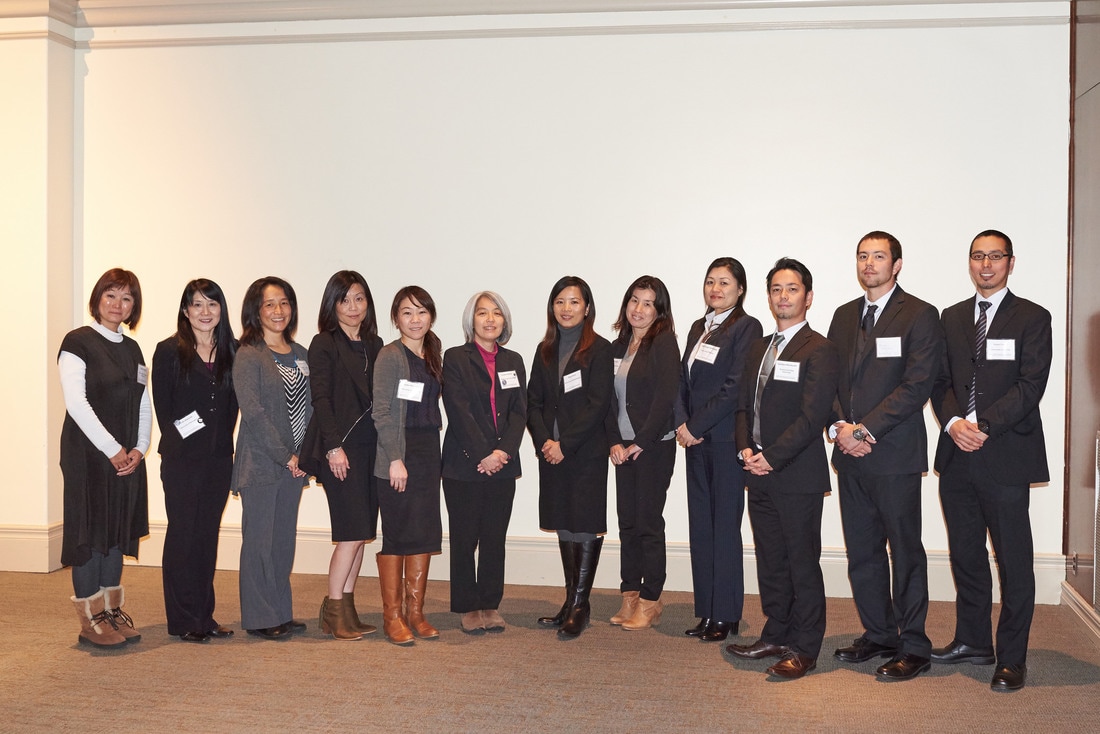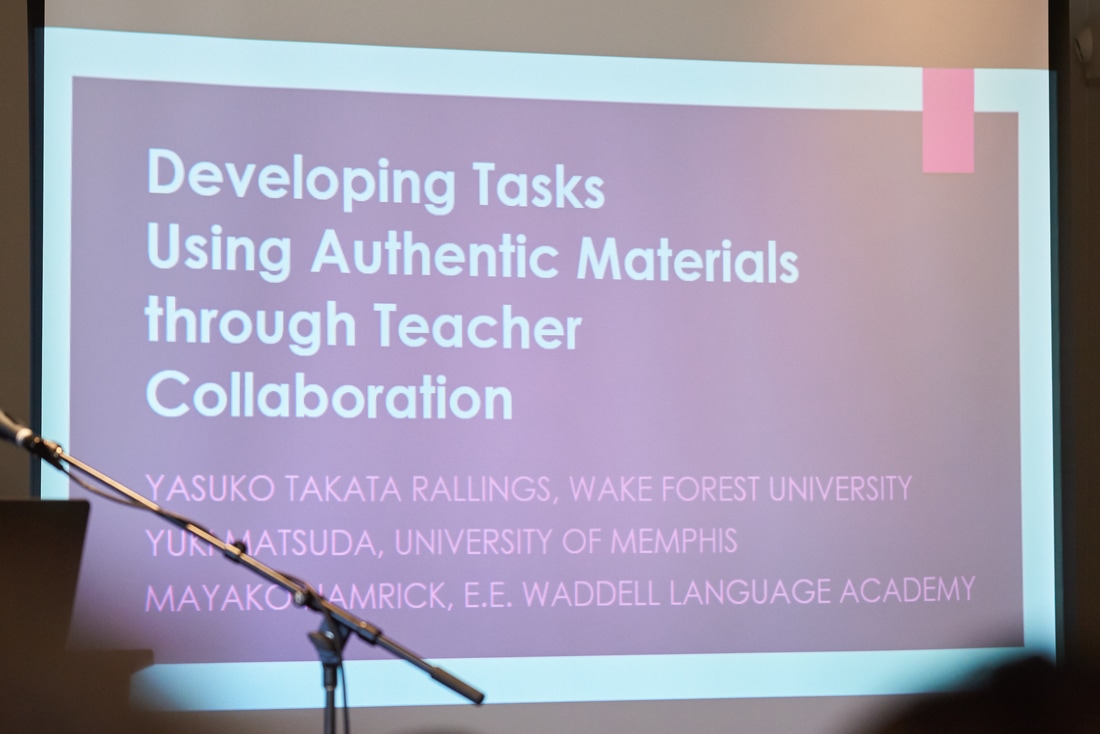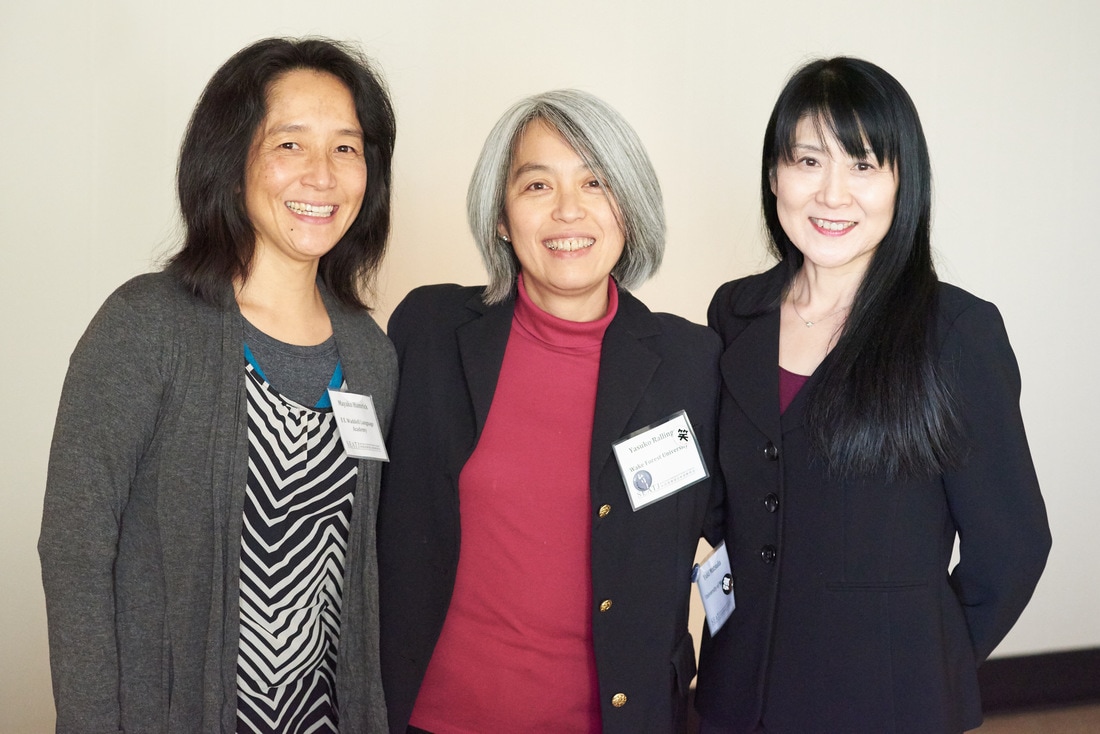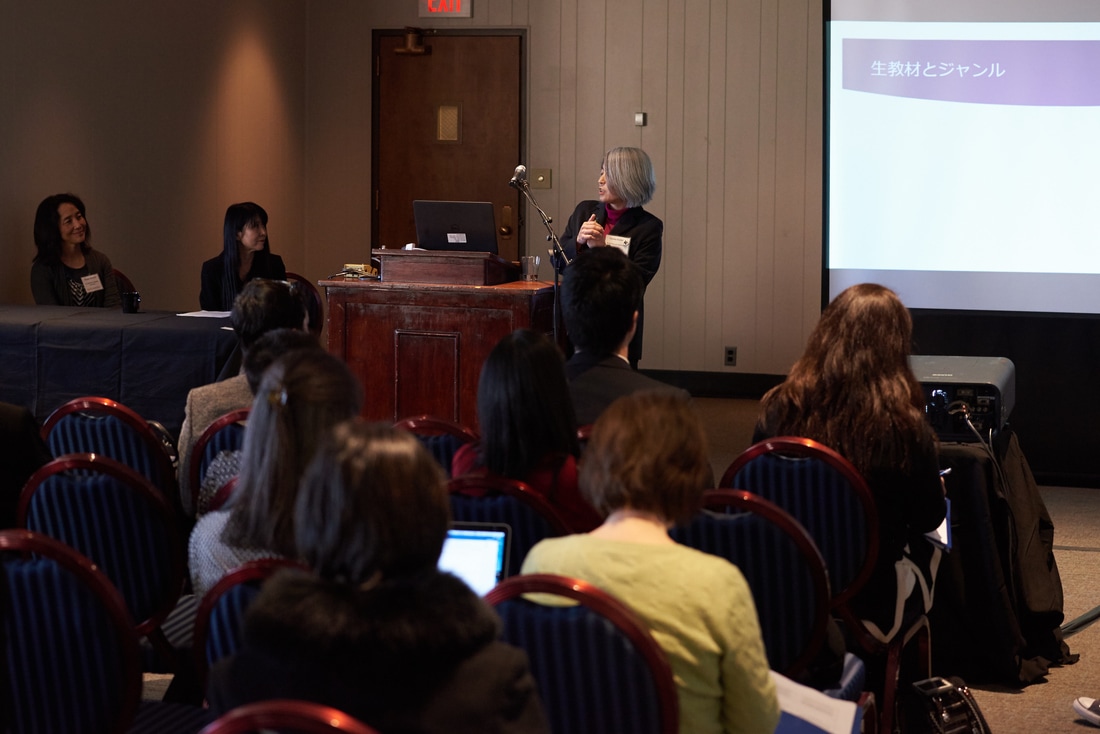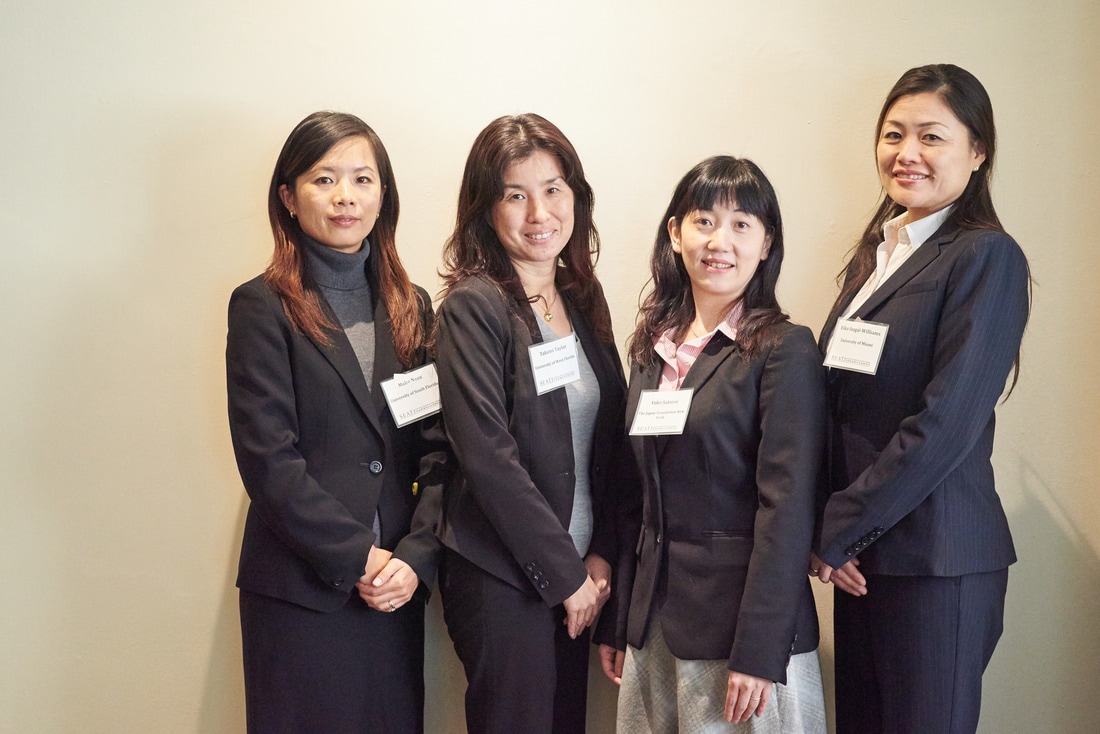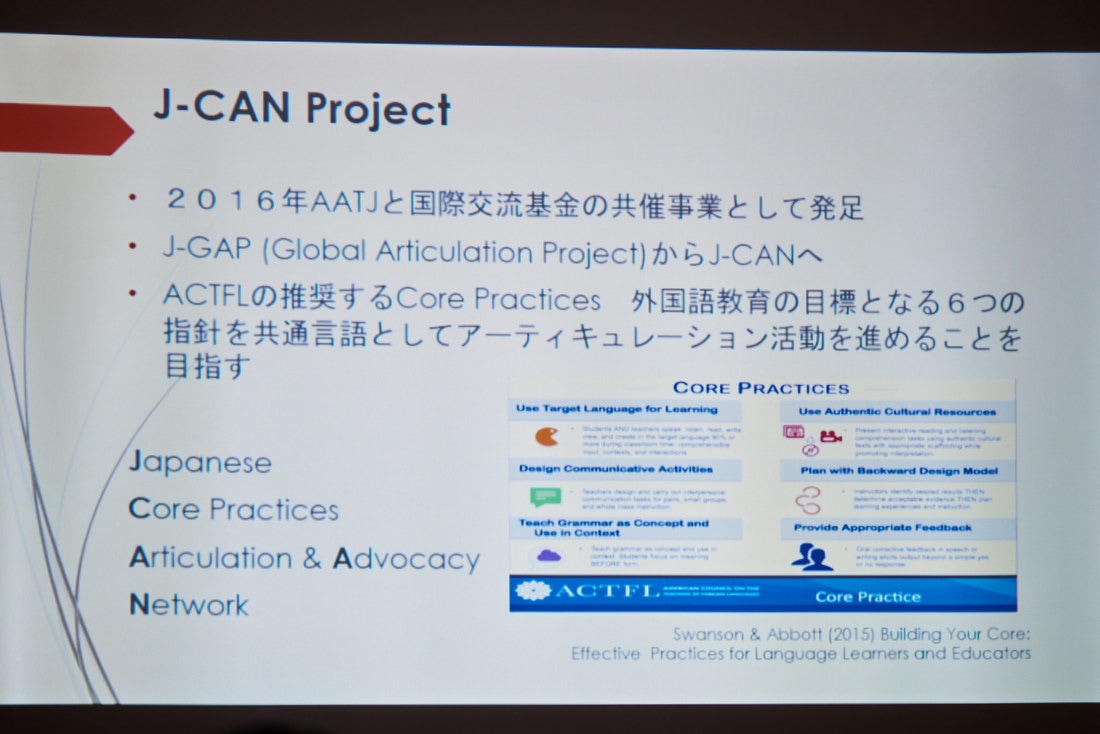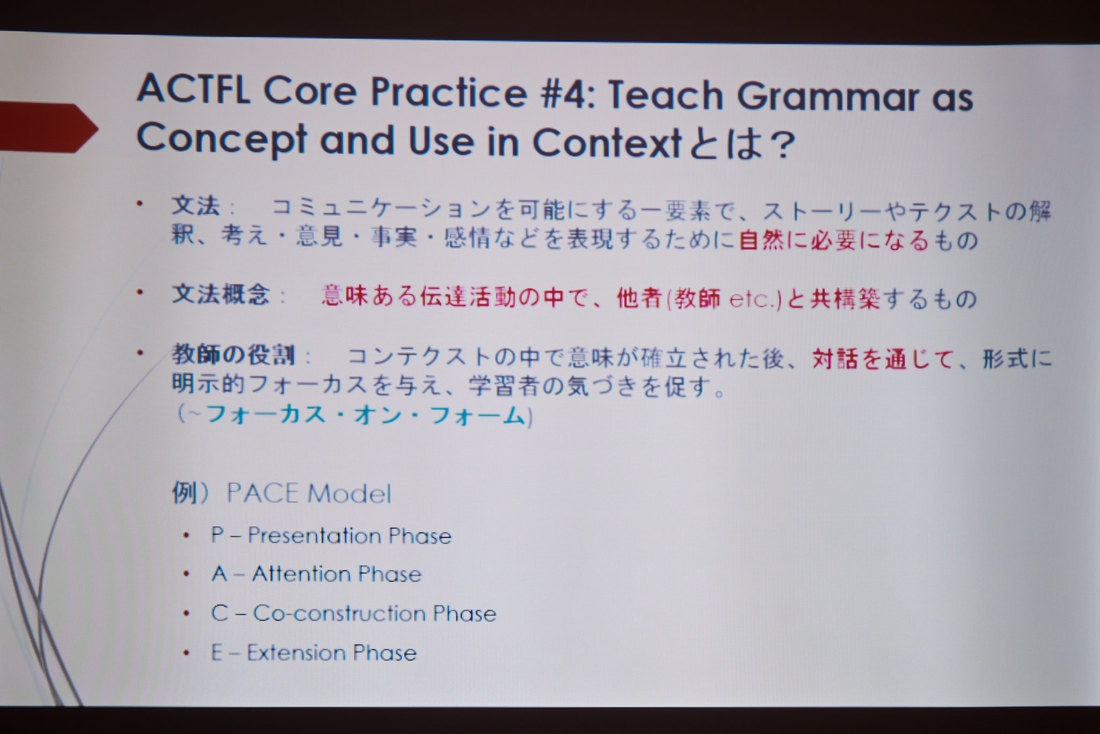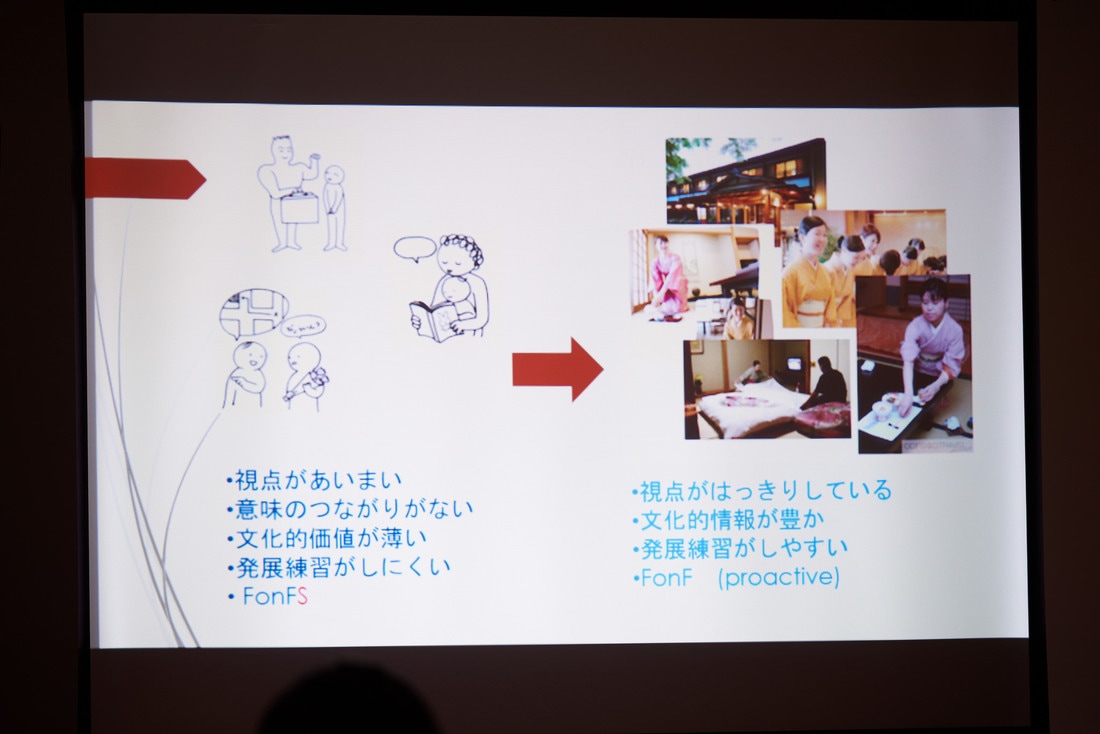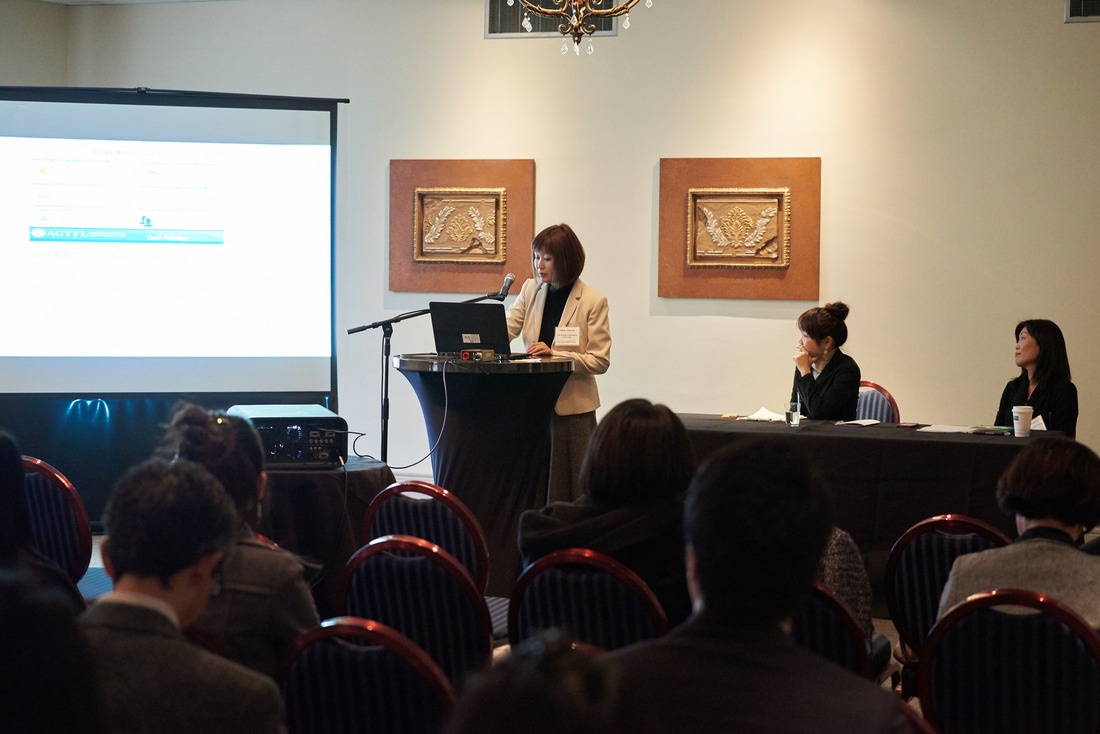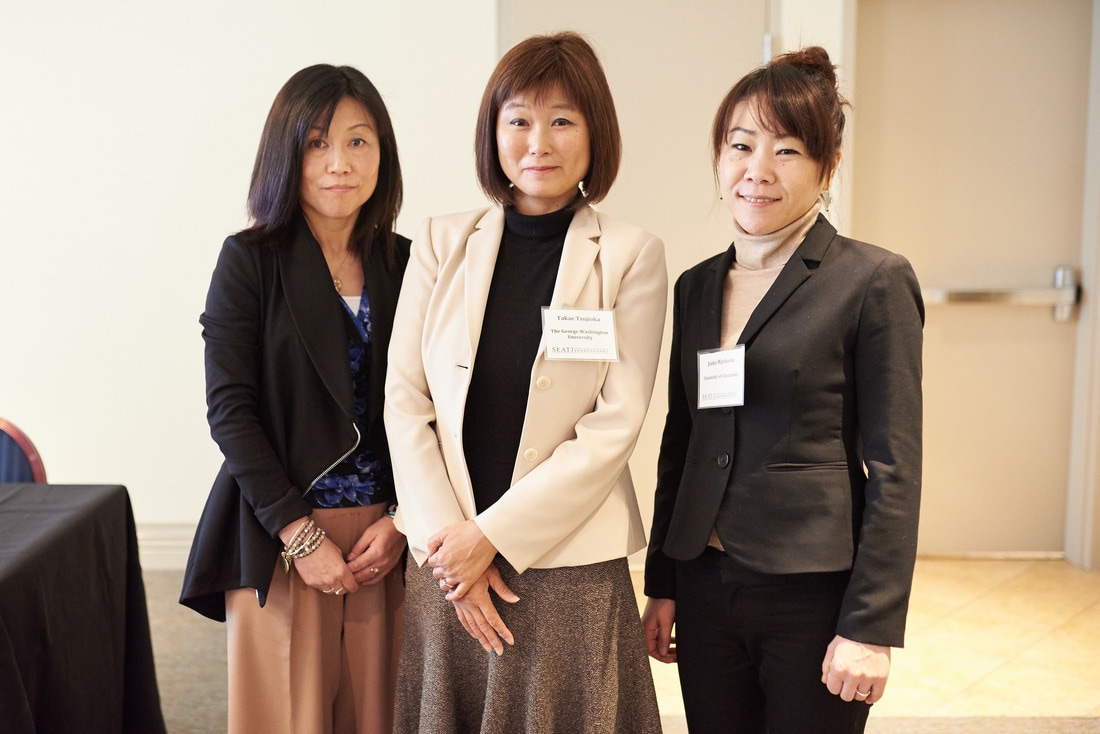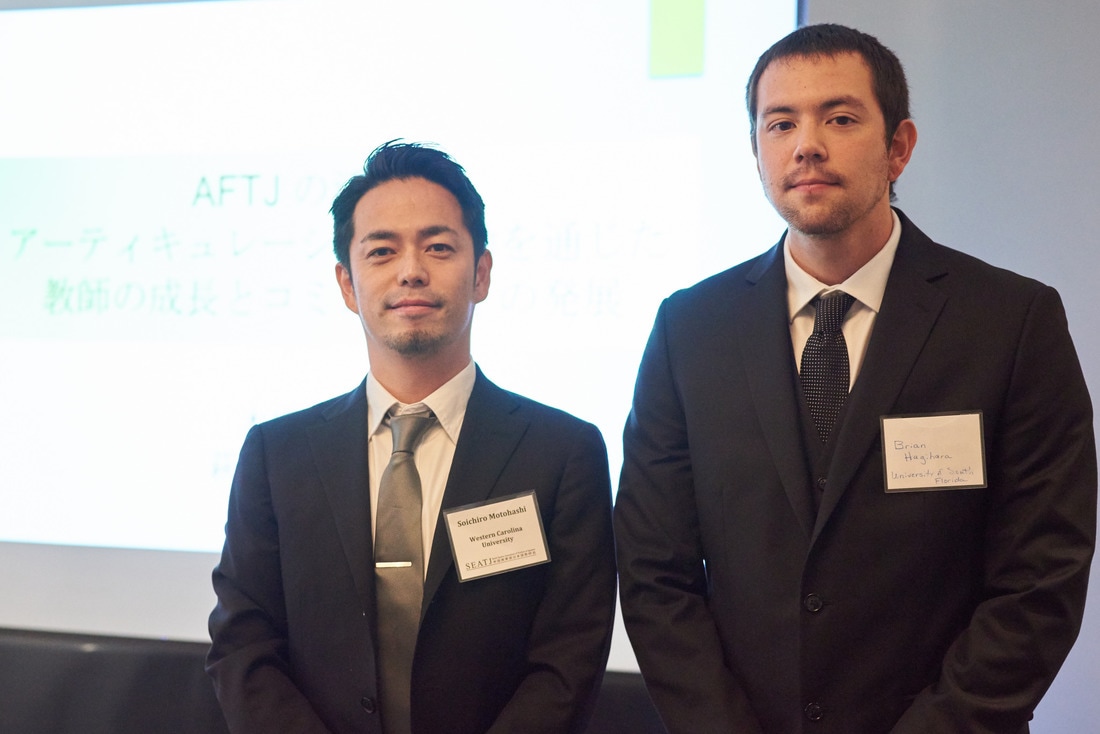J-CANメンバーによるSEATJ学会参加と発表
SEATJ 2017
Southeastern Association of Teachers of Japanese (SEATJ)
The 31st Annual SEATJ Conference
February 4-5, 2017
Middle Tennessee State University in Murfreesboro, TN
Southeastern Association of Teachers of Japanese (SEATJ)
The 31st Annual SEATJ Conference
February 4-5, 2017
Middle Tennessee State University in Murfreesboro, TN
Developing tasks using authentic materials through teacher collaboration (SEATJ)
Yasuko Takata Rallings (Wake Forest University)
Yuki Matsuda (University of Memphis)
Mayako Hamrick (EE Waddell Language Academy)
Yuki Matsuda (University of Memphis)
Mayako Hamrick (EE Waddell Language Academy)
発表要旨
Researchers have long been emphasizing the importance of the use of authentic materials in the world language classroom. Such materials present authentic contexts for communication, provide cultural input, and motivate learners. ACTFL lists the use of authentic cultural texts as one of the six core practices of world language education. World language teachers are called to implement interactive reading and listening comprehension tasks using authentic texts while scaffolding to promote comprehension. It is commonly recognized among Japanese teachers that it is challenging to create tasks using authentic Japanese texts. We propose that collaboration among teachers is the key to developing such tasks. In this session, we will present a material-sharing project among six Japanese teachers. We will first describe the use of authentic texts as they relate to core practices, world readiness standards for learning languages, and proficiency guidelines. Understanding standards and guidelines helps us set appropriate objectives for learning tasks. We will then show some of the tasks we have individually created using authentic texts, and describe the process of material-sharing and how it has impacted our teaching. Giving and receiving feedback to and from each other enables us to reflect on whether these tasks are appropriate for particular proficiency levels and if they meet learning objectives. Also, the fact that project collaborators include teachers at kindergarten, middle school, high school, and university levels helps us understand various proficiency levels and broaden the range of tasks and authentic texts to create. We hope to encourage teachers to incorporate more authentic texts in their curricula and to collaborate more with colleagues.
Researchers have long been emphasizing the importance of the use of authentic materials in the world language classroom. Such materials present authentic contexts for communication, provide cultural input, and motivate learners. ACTFL lists the use of authentic cultural texts as one of the six core practices of world language education. World language teachers are called to implement interactive reading and listening comprehension tasks using authentic texts while scaffolding to promote comprehension. It is commonly recognized among Japanese teachers that it is challenging to create tasks using authentic Japanese texts. We propose that collaboration among teachers is the key to developing such tasks. In this session, we will present a material-sharing project among six Japanese teachers. We will first describe the use of authentic texts as they relate to core practices, world readiness standards for learning languages, and proficiency guidelines. Understanding standards and guidelines helps us set appropriate objectives for learning tasks. We will then show some of the tasks we have individually created using authentic texts, and describe the process of material-sharing and how it has impacted our teaching. Giving and receiving feedback to and from each other enables us to reflect on whether these tasks are appropriate for particular proficiency levels and if they meet learning objectives. Also, the fact that project collaborators include teachers at kindergarten, middle school, high school, and university levels helps us understand various proficiency levels and broaden the range of tasks and authentic texts to create. We hope to encourage teachers to incorporate more authentic texts in their curricula and to collaborate more with colleagues.
発表レポート
本発表は、ACTFL Six Core Practicesの中のUse Authentic Texts に焦点を当てた。Authentic texts (以下、生教材と呼ぶ)をコミュニケーション活動に取り入れる重要性は、World Readiness Standardsや21st Century Skills Map などで推奨されているが、学生にとって生教材を読むのは難しい、適当な教材を探すのに手間がかかる、などの理由で、カリキュラムに取り入れるのに躊躇してしまう場合が多いのが現実である。しかし、複数の教師が協力して教材を共有することにより、生教材を取り入れた学習活動を作りやすい体制ができるのではないだろうか。この発表では、教材共有グループの仕組みの説明、そして、幼稚園と大学生を対象にした生教材とクラス活動を紹介し、教材共有のインパクトについて述べた。今後は教材共有グループに参加する教師の数を増やし、教材をジャンルごとに分けるなどの工夫をしていきたい。また、評価の仕方についての話し合いも含めることによって、縦と横のアーティキュレーションにもつなげていきたいと願っている。
本発表は、ACTFL Six Core Practicesの中のUse Authentic Texts に焦点を当てた。Authentic texts (以下、生教材と呼ぶ)をコミュニケーション活動に取り入れる重要性は、World Readiness Standardsや21st Century Skills Map などで推奨されているが、学生にとって生教材を読むのは難しい、適当な教材を探すのに手間がかかる、などの理由で、カリキュラムに取り入れるのに躊躇してしまう場合が多いのが現実である。しかし、複数の教師が協力して教材を共有することにより、生教材を取り入れた学習活動を作りやすい体制ができるのではないだろうか。この発表では、教材共有グループの仕組みの説明、そして、幼稚園と大学生を対象にした生教材とクラス活動を紹介し、教材共有のインパクトについて述べた。今後は教材共有グループに参加する教師の数を増やし、教材をジャンルごとに分けるなどの工夫をしていきたい。また、評価の仕方についての話し合いも含めることによって、縦と横のアーティキュレーションにもつなげていきたいと願っている。
Implementation of Can-Do Statements in the Genki I Japanese courses (AFTJ)
Eiko Isogai Williams (University of Miami)
Yoko Sakurai (Japan Foundation-New York)
Mako Nozu (University of South Florida)
Naoko Komura (Florida International University)
Takami Taylor (University of West Florida)
Yoko Sakurai (Japan Foundation-New York)
Mako Nozu (University of South Florida)
Naoko Komura (Florida International University)
Takami Taylor (University of West Florida)
発表要旨
The Can-Do Statements Articulation Project was initiated in 2014, and AFTJ members from various institutions collaborate to design Can-Do Statements (CDS) for the first year Japanese courses. CDS based on the Genki I textbook adopts the backward design, focusing on communication ability rather than technical grammar acquisition. The project aims to improve the effectiveness of daily teaching and the overall course curriculum by incorporating a task-based approach with the use of CDS in Japanese courses. CDS provide self-assessment tools for learners and serve as resources for designing pinpoint activities and efficient teaching plans. The presenters will discuss their reflections on the use of CDS in their courses and the impact of CDS on teaching effectiveness and students’ proficiency and literacy, as well as their challenges of transformation from grammar-based activities to communicative activities with concentration on task completions. The presenters will share their CDS for first-year Japanese courses and their experiences in adopting them in their classes. The audience will have the opportunity to see examples of classroom activities based on CDS, and students’ reactions and feedback on the integration of CDS in their daily learning. Throughout the informative PowerPoint presentation, the participants will learn to choose CDS that correspond with their objectives of each lesson, create curricula where goals and outcomes are clearly articulated with implementation of CDS, and design daily teaching plans that demonstrate effective process towards to goals in CDS. After the presentation, the audience will understand that CDS are an effective tool that strengthens their students’ performance and motivation, while enhancing classroom experiences.
The Can-Do Statements Articulation Project was initiated in 2014, and AFTJ members from various institutions collaborate to design Can-Do Statements (CDS) for the first year Japanese courses. CDS based on the Genki I textbook adopts the backward design, focusing on communication ability rather than technical grammar acquisition. The project aims to improve the effectiveness of daily teaching and the overall course curriculum by incorporating a task-based approach with the use of CDS in Japanese courses. CDS provide self-assessment tools for learners and serve as resources for designing pinpoint activities and efficient teaching plans. The presenters will discuss their reflections on the use of CDS in their courses and the impact of CDS on teaching effectiveness and students’ proficiency and literacy, as well as their challenges of transformation from grammar-based activities to communicative activities with concentration on task completions. The presenters will share their CDS for first-year Japanese courses and their experiences in adopting them in their classes. The audience will have the opportunity to see examples of classroom activities based on CDS, and students’ reactions and feedback on the integration of CDS in their daily learning. Throughout the informative PowerPoint presentation, the participants will learn to choose CDS that correspond with their objectives of each lesson, create curricula where goals and outcomes are clearly articulated with implementation of CDS, and design daily teaching plans that demonstrate effective process towards to goals in CDS. After the presentation, the audience will understand that CDS are an effective tool that strengthens their students’ performance and motivation, while enhancing classroom experiences.
発表レポート
AFTJメンバーによる「げんき」に基づいた初級日本語クラス用のCan-doステートメントの作成プロジェクトは2014年に始まった。今回の発表はCan-doステートメント作成の経緯、実際に第一版のステートメントに基づいた授業で行ったアクティビティの紹介、参加メンバーによる教師のフィードバックと学生の自己評価例、教師の感じたチャレンジという点についてまとめたものであった。
この発表の準備をする上で、2017年のCan-doプロジェクトの方向性が確定し、これからTask-based Language Teaching アプローチ(以下TBLT)を授業に取り入れていこうということになった。現在、メンバーたちは協力し合ってTBLTについての理解をさらに深めようとしているところである。今後はCan-doを軸にTBLT、学生の自己評価、アセスメントなどにもプロジェクトを派生させていく予定である。
AFTJメンバーによる「げんき」に基づいた初級日本語クラス用のCan-doステートメントの作成プロジェクトは2014年に始まった。今回の発表はCan-doステートメント作成の経緯、実際に第一版のステートメントに基づいた授業で行ったアクティビティの紹介、参加メンバーによる教師のフィードバックと学生の自己評価例、教師の感じたチャレンジという点についてまとめたものであった。
この発表の準備をする上で、2017年のCan-doプロジェクトの方向性が確定し、これからTask-based Language Teaching アプローチ(以下TBLT)を授業に取り入れていこうということになった。現在、メンバーたちは協力し合ってTBLTについての理解をさらに深めようとしているところである。今後はCan-doを軸にTBLT、学生の自己評価、アセスメントなどにもプロジェクトを派生させていく予定である。
J-CAN Project: Teaching grammar as concept and using in context (MAATJ & OATJ)
Takae Tsujioka (George Washington University)
Hiromi Lamberson (Green Run HIgh School)
Junko Markovic (University of Cincinnati)
Yukiyo Moorman (Walt Whitman High School)
Kyoko Vaughan (Hayfield Secondary School)
Hiromi Lamberson (Green Run HIgh School)
Junko Markovic (University of Cincinnati)
Yukiyo Moorman (Walt Whitman High School)
Kyoko Vaughan (Hayfield Secondary School)
発表要旨
In this presentation, we will report on the progress of a MAATJ group project started as a result of J-CAN Articulation Workshop at the FLAVA 2016 conference in October 8th 2016. J-CAN, which stands for core-practice / articulation & advocacy /network, is a pioneering project that promotes better articulation among teachers of Japanese in the US through communication and collaboration based on the understanding of common core practices. The overall project is supported by Japan Foundation, Los Angeles and facilitated by American Association of Teachers of Japanese. This particular project team, consisting of a university faculty and three high school teachers in the DC/VA/MA region, chose to focus on one of the six ACTFL Core Practices: Teach Grammar as a Concept and use in context. We will discuss how we each deepen understanding of this practice, share ideas of classroom implementation through online discussions, classroom visits and video conferences. We will report on the impact that the project has had on individual members’ classroom instruction. We will also share some concrete tips for communication and project management to sustain a J-CAN project without making it a burden for members, such as utilizing Google folder to share teaching materials, as well as creating a discussion forum where each member can ask questions freely in a non-threatening environment and exchange ideas. While the project has just begun, we anticipate it will provide mutually beneficial learning opportunities for both college-level instructor and high school instructors, by bringing together teachers with different backgrounds, experiences, and personal beliefs in a mutually respectful manner.
In this presentation, we will report on the progress of a MAATJ group project started as a result of J-CAN Articulation Workshop at the FLAVA 2016 conference in October 8th 2016. J-CAN, which stands for core-practice / articulation & advocacy /network, is a pioneering project that promotes better articulation among teachers of Japanese in the US through communication and collaboration based on the understanding of common core practices. The overall project is supported by Japan Foundation, Los Angeles and facilitated by American Association of Teachers of Japanese. This particular project team, consisting of a university faculty and three high school teachers in the DC/VA/MA region, chose to focus on one of the six ACTFL Core Practices: Teach Grammar as a Concept and use in context. We will discuss how we each deepen understanding of this practice, share ideas of classroom implementation through online discussions, classroom visits and video conferences. We will report on the impact that the project has had on individual members’ classroom instruction. We will also share some concrete tips for communication and project management to sustain a J-CAN project without making it a burden for members, such as utilizing Google folder to share teaching materials, as well as creating a discussion forum where each member can ask questions freely in a non-threatening environment and exchange ideas. While the project has just begun, we anticipate it will provide mutually beneficial learning opportunities for both college-level instructor and high school instructors, by bringing together teachers with different backgrounds, experiences, and personal beliefs in a mutually respectful manner.
発表レポート
私達はACTFL コアプラクティスの一つであるTeach grammar as concept and use in contextの理解と実践を目標としたアーティキュレーション活動について報告した。まだ活動を始めて間もないが、これまでの成果と今後の展望についてまとめたのが今回の発表である。従来は、まず習得すべき文法項目を中心として文法の規則を説明し、それからドリル練習、応用練習という教室活動の流れが一般的である。ACTFLのコアプラクティスでは、意味ある伝達活動の中で、かつ言語形式に意識を向けさせるようなフォーカス・オン・フォーム型の指導方法が推奨されている。本発表では、これをもとに授業で試みた活動を紹介し、生教材の使用は教科書の断片的なドリル練習と違い、文化的背景が豊かで、意味ある伝達行動や発展練習がしやすいという利点があることを強調した。一方で、教科書や時間の制約に対処しながら実践するにはどうしたらよいかについて考え、従来のドリル練習を排除するのではなく、意味のあるコミュニケーション活動に変える試みについても提案した。生教材の利点は多いものの、適当な教材発掘には相当な時間がかかるので、今後もグループ内で教材を共有したり、アイデアや意見を交換したりして、文法を単なる規則としてではなく、コミュニケーションを可能にする一要素であると捉えた教授法や教室活動のあり方への理解を深めていく予定である。
私達はACTFL コアプラクティスの一つであるTeach grammar as concept and use in contextの理解と実践を目標としたアーティキュレーション活動について報告した。まだ活動を始めて間もないが、これまでの成果と今後の展望についてまとめたのが今回の発表である。従来は、まず習得すべき文法項目を中心として文法の規則を説明し、それからドリル練習、応用練習という教室活動の流れが一般的である。ACTFLのコアプラクティスでは、意味ある伝達活動の中で、かつ言語形式に意識を向けさせるようなフォーカス・オン・フォーム型の指導方法が推奨されている。本発表では、これをもとに授業で試みた活動を紹介し、生教材の使用は教科書の断片的なドリル練習と違い、文化的背景が豊かで、意味ある伝達行動や発展練習がしやすいという利点があることを強調した。一方で、教科書や時間の制約に対処しながら実践するにはどうしたらよいかについて考え、従来のドリル練習を排除するのではなく、意味のあるコミュニケーション活動に変える試みについても提案した。生教材の利点は多いものの、適当な教材発掘には相当な時間がかかるので、今後もグループ内で教材を共有したり、アイデアや意見を交換したりして、文法を単なる規則としてではなく、コミュニケーションを可能にする一要素であると捉えた教授法や教室活動のあり方への理解を深めていく予定である。
The development and expansion of the community through articulation projects in the Association of Florida Teachers of Japanese (AFTJ)
Soichiro Motohashi (AFTJ/ Western Carolina University)
Brian Hagihara (University of South Florida)
Brian Hagihara (University of South Florida)
発表要旨
We here at the Association of Florida Teachers of Japanese (AFTJ) have been focusing on the expansion of articulation, ever since the 2014 Japanese Global Articulation Project (J-GAP) Caravan Workshop. In addition, we have been actively applying to Japan Foundation Los Angeles (JFLA) grants to further develop our articulation activities. The result of this has strengthened the bond between teachers within the same institution, and even the bond between different institutions within the same state. Active membership has also increased and has promoted a healthy and lively culture. With us presenting details of our activities, other associations of teachers of Japanese may benefit greatly, especially those who have interest in articulation within their respective state, and developing stronger community ties. In our presentation, we will first introduce projects related to articulation which we have done since the J-GAP Caravan Workshop. These related projects include the Can-do Statements Project and Discussion forums. Next, we would like to introduce projects and activities we have pursued these past couple of years including the Articulation Day and the participation of the J-Can Workshop held at Old Dominion University in Virginia supported by the Japan Foundation (JF) grants. In addition, we would like to report on other activities held in various regions within the state of Florida, which include the Japanese Language Proficiency Test (JLPT) practice workshop with the Tampa Japan Exchange and Teaching Alumni Association (JET-AA) and the Miami Immersion Day. Finally, we would like to report on the results and analyses of a questionnaire regarding the past and future activities within our own AFTJ.
We here at the Association of Florida Teachers of Japanese (AFTJ) have been focusing on the expansion of articulation, ever since the 2014 Japanese Global Articulation Project (J-GAP) Caravan Workshop. In addition, we have been actively applying to Japan Foundation Los Angeles (JFLA) grants to further develop our articulation activities. The result of this has strengthened the bond between teachers within the same institution, and even the bond between different institutions within the same state. Active membership has also increased and has promoted a healthy and lively culture. With us presenting details of our activities, other associations of teachers of Japanese may benefit greatly, especially those who have interest in articulation within their respective state, and developing stronger community ties. In our presentation, we will first introduce projects related to articulation which we have done since the J-GAP Caravan Workshop. These related projects include the Can-do Statements Project and Discussion forums. Next, we would like to introduce projects and activities we have pursued these past couple of years including the Articulation Day and the participation of the J-Can Workshop held at Old Dominion University in Virginia supported by the Japan Foundation (JF) grants. In addition, we would like to report on other activities held in various regions within the state of Florida, which include the Japanese Language Proficiency Test (JLPT) practice workshop with the Tampa Japan Exchange and Teaching Alumni Association (JET-AA) and the Miami Immersion Day. Finally, we would like to report on the results and analyses of a questionnaire regarding the past and future activities within our own AFTJ.
発表レポート
本発表では、 2014年に開催されたJ-GAPキャラバン・ワークショップ以降、積極的に取り組んでいるAFTJ内のアーティキュレーションの重要性についての報告をした。AFTJでは、毎年国際交流基金(JF)の各種グラントを得てワークショップやコンテストなど様々なイベントを開催することで、アーティキュレーション活動をより実りのあるものにしている。その結果、同じ大学間や他大学プログラム間の教師の繋がりが強化しつつあり、AFTJの活動におけるアクティブメンバーが増加し教師会としての動きが活発になっている。これらAFTJの活動報告を通じ、州内アーティキュレーションによるコミュニティ発展に関心のある他州の教師会にとっても、今後の活動の手がかりにしてもらいたいという点も考慮した。また、AFTJ所属メンバーの教師会の活動に関するアンケートの結果と分析により、アーティキュレーション活動への参加と時間の確保のバランスなど現状の課題を明確にできた。さらに、教師館の情報共有の効率化のためのクラウドの活用などのアイデアも実現していきたい。
本発表では、 2014年に開催されたJ-GAPキャラバン・ワークショップ以降、積極的に取り組んでいるAFTJ内のアーティキュレーションの重要性についての報告をした。AFTJでは、毎年国際交流基金(JF)の各種グラントを得てワークショップやコンテストなど様々なイベントを開催することで、アーティキュレーション活動をより実りのあるものにしている。その結果、同じ大学間や他大学プログラム間の教師の繋がりが強化しつつあり、AFTJの活動におけるアクティブメンバーが増加し教師会としての動きが活発になっている。これらAFTJの活動報告を通じ、州内アーティキュレーションによるコミュニティ発展に関心のある他州の教師会にとっても、今後の活動の手がかりにしてもらいたいという点も考慮した。また、AFTJ所属メンバーの教師会の活動に関するアンケートの結果と分析により、アーティキュレーション活動への参加と時間の確保のバランスなど現状の課題を明確にできた。さらに、教師館の情報共有の効率化のためのクラウドの活用などのアイデアも実現していきたい。
地域の教師会J-CANプロジェクト
